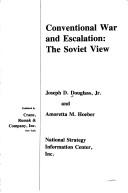| Listing 1 - 10 of 55 | << page >> |
Sort by
|
Book
Year: 1965 Publisher: New York: Praeger,
Abstract | Keywords | Export | Availability | Bookmark
 Loading...
Loading...Choose an application
- Reference Manager
- EndNote
- RefWorks (Direct export to RefWorks)
Book
Year: 1966 Publisher: Paris: Calmann-Lévy,
Abstract | Keywords | Export | Availability | Bookmark
 Loading...
Loading...Choose an application
- Reference Manager
- EndNote
- RefWorks (Direct export to RefWorks)
Book
ISBN: 3863882997 9783863882990 3863887360 9783863887360 Year: 2017 Publisher: Leverkusen Budrich UniPress
Abstract | Keywords | Export | Availability | Bookmark
 Loading...
Loading...Choose an application
- Reference Manager
- EndNote
- RefWorks (Direct export to RefWorks)
Since its early beginnings peace and conflict research has focused on causes of phenomena such as civil war, terrorism, and state failure. The author merges this approach with a peace causes perspective and asks why civil war happened in Peru (1980-1995) though not in Bolivia, which is striking given the structural similarities with Peru as well as a number of escalation episodes leading the country to the brink of civil war (2000-2008). He explores the political measures such as reforms and political dialogue, which prevented the country from rather hazardous consequences.
Peru --- History. --- Bolivia --- civil war --- escalation
Book
Year: 2020 Publisher: Frontiers Media SA
Abstract | Keywords | Export | Availability | Bookmark
 Loading...
Loading...Choose an application
- Reference Manager
- EndNote
- RefWorks (Direct export to RefWorks)
This eBook is a collection of articles from a Frontiers Research Topic. Frontiers Research Topics are very popular trademarks of the Frontiers Journals Series: they are collections of at least ten articles, all centered on a particular subject. With their unique mix of varied contributions from Original Research to Review Articles, Frontiers Research Topics unify the most influential researchers, the latest key findings and historical advances in a hot research area! Find out more on how to host your own Frontiers Research Topic or contribute to one as an author by contacting the Frontiers Editorial Office: frontiersin.org/about/contact
police --- de-escalation --- psychophysiology --- decision making --- stress
Book
Abstract | Keywords | Export | Availability | Bookmark
 Loading...
Loading...Choose an application
- Reference Manager
- EndNote
- RefWorks (Direct export to RefWorks)
War games. --- Escalation (Military science) --- Mathematical models.
Book
ISBN: 0674945956 9780674945951 Year: 1977 Publisher: Cambridge, Mass. Harvard University Press
Abstract | Keywords | Export | Availability | Bookmark
 Loading...
Loading...Choose an application
- Reference Manager
- EndNote
- RefWorks (Direct export to RefWorks)
Polemology --- War --- Military history, Modern --- Escalation (Military science) --- Military history, Modern. --- War. --- Escalation (Military science).
Book
ISBN: 9780415579896 9780203839355 9781136883996 9781136884030 9781136884047 9781138788930 Year: 2011 Publisher: Milton Park, Abingdon ;N.Y. Routledge
Abstract | Keywords | Export | Availability | Bookmark
 Loading...
Loading...Choose an application
- Reference Manager
- EndNote
- RefWorks (Direct export to RefWorks)
Book
ISBN: 9780801478857 Year: 2014
Abstract | Keywords | Export | Availability | Bookmark
 Loading...
Loading...Choose an application
- Reference Manager
- EndNote
- RefWorks (Direct export to RefWorks)
The author demonstrates here how the interplay between conventional military operations and nuclear forces could, in conflicts among states armed with both conventional and nuclear weaponry, inadvertently produce pressures for nuclear escalation. Knowledge of these hidden pressures, he believes, may help some future decision maker avoid catastrophes. Building a formidable argument that moves with cumulative force, he details the way in which escalation could occur not by mindless accident, or by deliberate preference for nuclear escalation, but rather as a natural accompaniment of land, naval, or air warfare at the conventional level. The author bases his analysis on an empirical study of the east-west military competition in Europe during the 1980s, using a conceptual framework drawn from international relations theory, organization theory, and strategic theory.
NUCLEAR THRESHOLD (STRATEGY) --- ESCALATION (MILITARY SCIENCE) --- LIMITED WAR

ISBN: 0844813907 9780844813905 Year: 1981 Volume: 37 Publisher: New York: Crane, Russak,
Abstract | Keywords | Export | Availability | Bookmark
 Loading...
Loading...Choose an application
- Reference Manager
- EndNote
- RefWorks (Direct export to RefWorks)
Book
ISBN: 0813372003 Year: 1986 Publisher: Boulder, CO : Westview,
Abstract | Keywords | Export | Availability | Bookmark
 Loading...
Loading...Choose an application
- Reference Manager
- EndNote
- RefWorks (Direct export to RefWorks)
| Listing 1 - 10 of 55 | << page >> |
Sort by
|

 Search
Search Feedback
Feedback About UniCat
About UniCat  Help
Help News
News